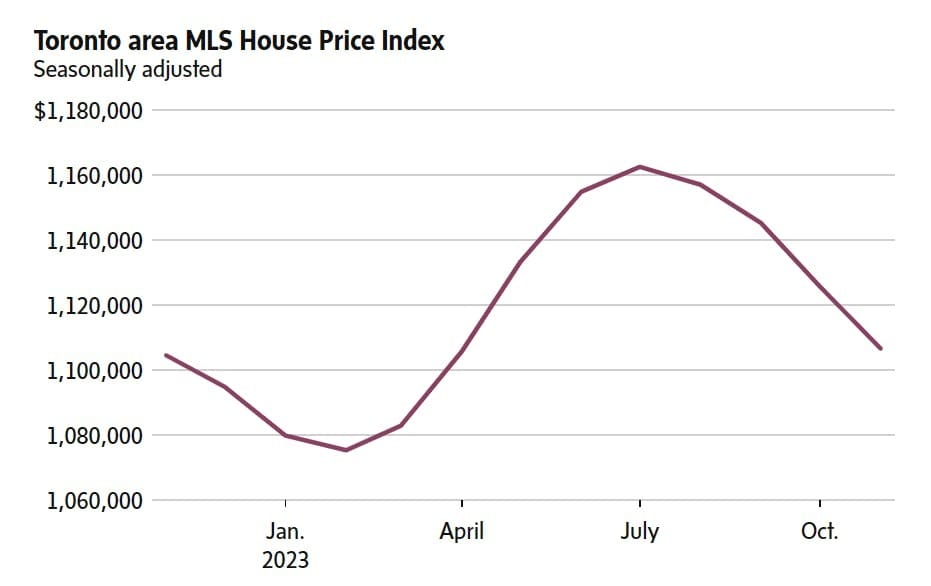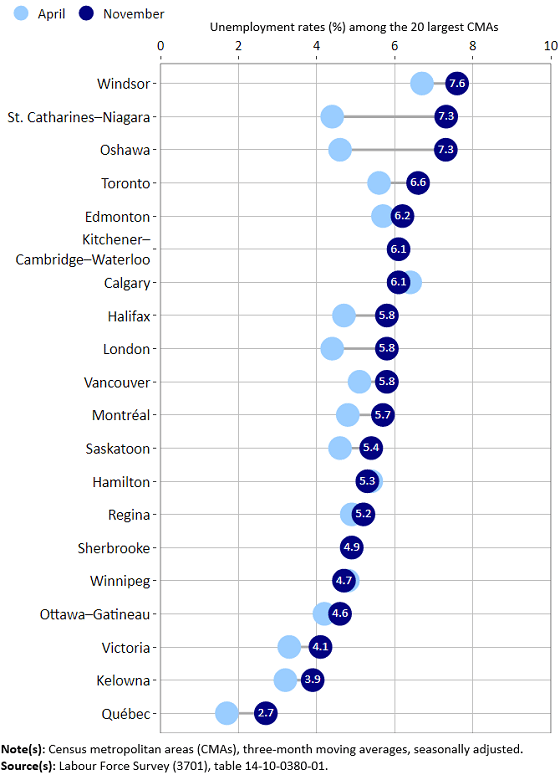- Urban 411
- Posts
- Your Weekly 411: Toronto Home Prices Stay Steady Despite Slow Sales|Property Prices in Oakville Skyrocket | New Report: Short-Terms Rental Impacts on the Housing Market
Your Weekly 411: Toronto Home Prices Stay Steady Despite Slow Sales|Property Prices in Oakville Skyrocket | New Report: Short-Terms Rental Impacts on the Housing Market
New Report: Short-Terms Rental Impacts on the Housing Market

The Weekly 411 TLDR: 🌇 Toronto Home Prices Remain Steady Despite Slow Sales 🚀 Property Prices in Oakville Continue to Skyrocket 👀 New Report: How Short-Terms Rentals Impact the Housing Market 💼 Canada's Unemployment Rate Rises Again 🍔 Fun Fact: McDonald's Dominates Commercial Real Estate |
🌇 Toronto Home Prices Remain Steady Despite Decrease in Sales
In November 2023, home sales in Greater Toronto fell by 6% compared to the same time last year.
There were 4,236 home sales in November 2023, a decrease of 8.7% from October 2023's 4,640 sales.
Despite the decline in sales, the average home price remained relatively unchanged at $1,082,179
New listings increased by 16.5% in November 2023, amounting to 10,545 compared to 9,053 in November 2022.
Why This Matters: The 6% decrease in home sales in Greater Toronto, despite a notable 16.5% increase in new listings, suggests a potential shift in market dynamics. The stable average home price at $1,082,179 indicates resilience in the market, highlighting the importance for investors to assess the impact of supply and demand imbalances on future pricing trends.

🚀 Home Prices in Oakville Continue to Skyrocket
The average home price across the region rose by 0.81% to $1,208,950.
The average prices for different types of houses in the region are: detached house - $1,482,380, semi-detached house - $933,548, townhouse - $1,007,924, condo - $906,269.
In November, a total of 428 homes were sold in Halton.
In Halton, including Oakville, Burlington, Milton, and Halton Hills, there is currently 2.2 months' worth of inventory available.
Why This Matters: The significant 0.81% increase in the average home price in Oakville, reaching $1,208,950, underscores a robust market with rising property values. As well, the 2.2 months' worth of inventory across Halton signals potential scarcity.
👀 New Report: How Short-Terms Rentals Impact the Housing Market
A new market report suggests that neighborhoods with a high prevalence of short-term rentals (STRs) experience faster-rising rents, lower vacancy rates, and higher home sale prices.
STR listings represent 1.4% of Canada's housing stock.
A strong estimated vacancy of 1.9%, indicates a strong rental market and the potential for high occupancy rates.
Last month the federal government announced changes to tax deductions related to STR income in areas where STRs are prohibited or non-compliant areas.
Why This Matters: Provinces like British Columbia and Quebec have introduced legislation to limit STRs, potentially increasing the inventory for long-term rental properties. However, increased regulations on STRs by cities and provinces can create more stable and predictable operating conditions for STR investors.
💼 Canada's Unemployment Rate Rises Again in November
The unemployment rate increased by 0.1 percentage points to 5.8%, continuing an upward trend
Population increases contribute to the rise in the national unemployment rate, as Canada has added approximately 800,000 people in 2023, impacting the calculation of the unemployment rate.
The unemployment rate in St. Catharines-Niagara and Oshawa saw the largest increases from April to November among Canada's 20 largest cities.
Why This Matters: Investors should focus on regions witnessing job growth, as these areas are likely to experience increased housing demand. Simultaneously, targeting locations with higher unemployment rates may present opportunities for strategic investments, such as value-add projects or property acquisitions in anticipation of economic recovery.

🍔 Fun Fact: McDonald's Dominates Canada's Commercial Real Estate Sector
In Canada, McDonald's operates around 1,400 locations, serving about 2.5 million people daily.
McDonald's either owns or leases the land and building for each franchised location, with franchise owners responsible for decor, seating, signs, and equipment.
McDonald's Canada expanded rapidly to 50 locations within three years, over 250 locations by 1977 and over a thousand locations by 1992. Today, over 85% of Canadian McDonald's restaurants are locally owned by independent entrepreneurs.
Ontario has the highest number of McDonald's Canada locations with 514 spots, followed by Quebec with 323 locations, and Alberta with 201 locations.